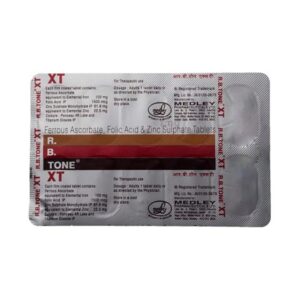FOLIC ACID + DIBASIC CALCIUM PHOSPHATE + FERROUS FLUCONATE
Folic Acid: Drug: Folic Acid
Use: Folic Acid, also known as vitamin B9, is commonly used as a dietary supplement to treat or prevent folic acid deficiency. It is also prescribed to women who are pregnant or planning to become pregnant to help prevent certain birth defects of the brain and spine, such as spina bifida.
Mechanism of Action: Folic acid plays a crucial role in the synthesis and repair of DNA, as well as in cell division and growth. It is necessary for the production of red blood cells, nerve cells, and DNA, making it essential for the proper function and growth of the body.
Dose: The usual dose of folic acid for adults is 400 to 800 micrograms (mcg) per day. The recommended dose for pregnant women is usually higher, around 600 to 800 mcg per day. The exact dose may vary depending on individual needs and the specific medical condition being treated, so it is important to follow the dosage instructions provided by the healthcare professional.
Side Effects: Folic acid is generally well-tolerated, and side effects are rare when taken as directed. However, some individuals may experience mild side effects, including nausea, loss of appetite, bloating, gas, and a bitter or unpleasant taste in the mouth. These side effects are usually temporary and resolve on their own. In rare cases, allergic reactions may occur, characterized by symptoms such as rash, itching, swelling, dizziness, or difficulty breathing. If any severe or persistent side effects are experienced, medical attention should be sought immediately.
It is important to note that folic acid can interact with certain medications, such as methotrexate, phenytoin, and sulfasalazine, among others. Therefore, it is advisable to inform the healthcare professional about all the medications being taken before starting folic acid supplementation or any other new treatment.
Dibasic Calcium Phosphate: Dibasic Calcium Phosphate, also known as calcium hydrogen phosphate or dibasic calcium phosphate dihydrate, is a medication used as a calcium supplement. It is commonly used to prevent and treat calcium deficiency in conditions such as osteoporosis, rickets, or hypoparathyroidism.
The mechanism of action of Dibasic Calcium Phosphate involves providing the body with an adequate amount of calcium. Calcium is an essential mineral that plays a crucial role in various physiological processes, including bone health, muscle function, nerve transmission, and blood clotting. By supplementing with Dibasic Calcium Phosphate, the body can maintain optimal calcium levels, which is necessary for proper functioning.
Dibasic Calcium Phosphate is available in oral tablet or powder form. The typical recommended dose varies depending on the individual’s age, condition, and the severity of calcium deficiency. It is generally taken with food to enhance absorption.
Like any medication, Dibasic Calcium Phosphate may have some side effects. Common side effects include stomach upset, constipation, and gas. These symptoms are usually mild and transient. In rare cases, high doses or prolonged use may lead to hypercalcemia (high levels of calcium in the blood), which can cause symptoms such as nausea, vomiting, confusion, and kidney problems.
It is important to note that Dibasic Calcium Phosphate may interact with certain medications, such as tetracycline antibiotics, bisphosphonates, and calcium channel blockers. Therefore, it is crucial to consult a healthcare professional or pharmacist before starting or making any changes to the dosage of Dibasic Calcium Phosphate.
Ferrous Fluconate: Ferrous Fluconate is a medication commonly used to treat iron deficiency anemia. It is classified as an iron supplement and is often prescribed to individuals who have low levels of iron in their body, which can lead to symptoms such as fatigue, weakness, and pale skin.
The mechanism of action of Ferrous Fluconate involves replenishing iron stores in the body. Iron is an essential mineral that plays a crucial role in the production of hemoglobin, a protein responsible for carrying oxygen in the blood. When iron levels are low, the body is unable to produce an adequate supply of hemoglobin, resulting in anemia. Ferrous Fluconate provides the body with additional iron, allowing it to increase hemoglobin production and improve the overall oxygen-carrying capacity of the blood.
The recommended dose of Ferrous Fluconate may vary depending on the severity of the iron deficiency and individual patient factors. It is important to follow the prescribed dosage instructions provided by the healthcare professional. Typically, Ferrous Fluconate is taken orally, usually one to three times a day, with or without food.
As with any medication, Ferrous Fluconate may cause certain side effects. Common side effects include upset stomach, constipation, diarrhea, dark stools, and stomach cramps. These side effects are usually mild and temporary. In some cases, individuals may experience more severe side effects such as allergic reactions (rash, itching, swelling), difficulty breathing, or chest pain. It is important to seek medical attention if any severe or persistent side effects occur.
Overall, Ferrous Fluconate is an effective treatment for iron deficiency anemia when used as directed. However, it is essential to consult with a healthcare professional before initiating any new medications, to ensure it is the appropriate treatment option for your specific situation and to discuss potential drug interactions or contraindications.


